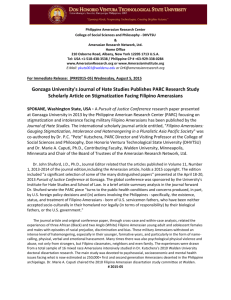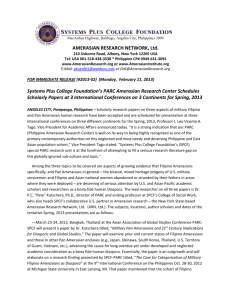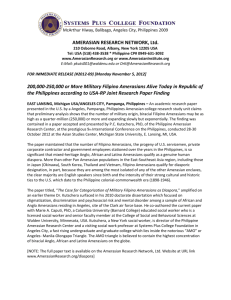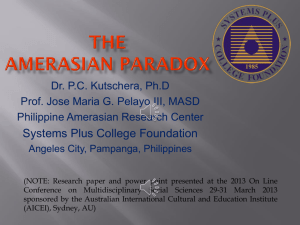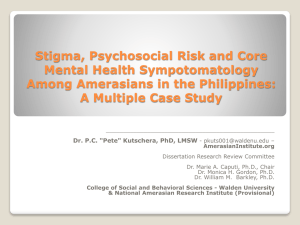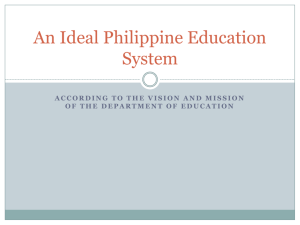SW Practice Amerasians PR# 2013-01
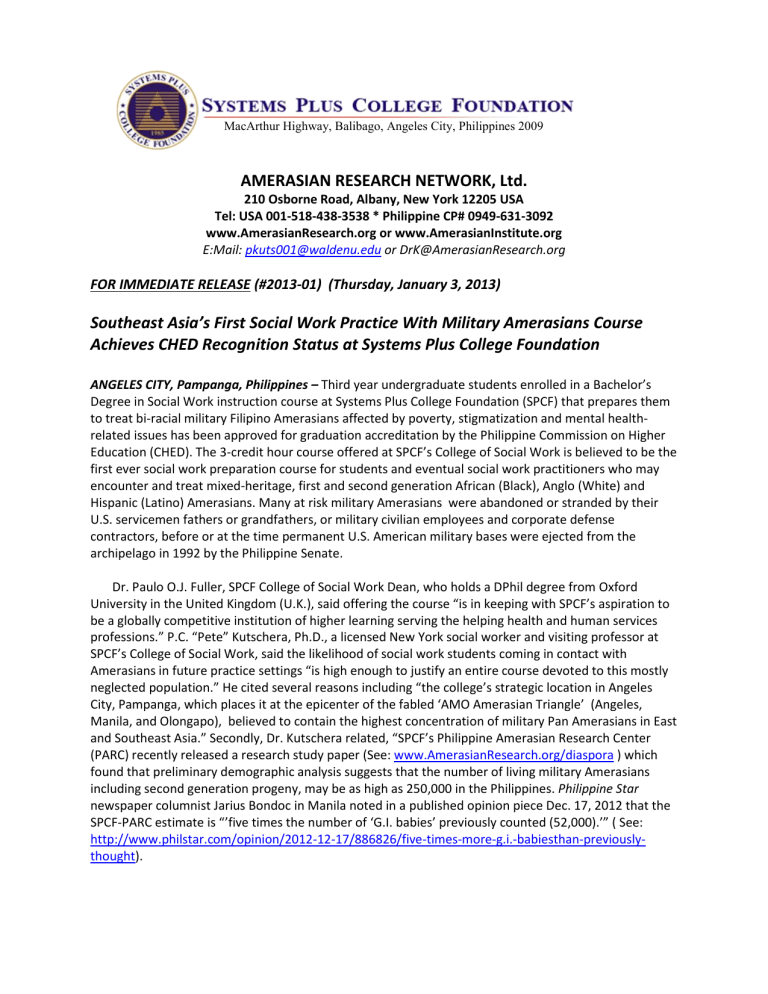
MacArthur Highway, Balibago, Angeles City, Philippines 2009
AMERASIAN RESEARCH NETWORK, Ltd.
210 Osborne Road, Albany, New York 12205 USA
Tel: USA 001-518-438‐3538 * Philippine CP# 0949‐631‐3092
www.AmerasianResearch.org or www.AmerasianInstitute.org
E:Mail: pkuts001@waldenu.edu
or DrK@AmerasianResearch.org
FOR IMMEDIATE RELEASE (#2013‐01) (Thursday, January 3, 2013)
Southeast Asia’s First Social Work Practice With Military Amerasians Course
Achieves CHED Recognition Status at Systems Plus College Foundation
ANGELES CITY, Pampanga, Philippines – Third year undergraduate students enrolled in a Bachelor’s
Degree in Social Work instruction course at Systems Plus College Foundation (SPCF) that prepares them to treat bi-racial military Filipino Amerasians affected by poverty, stigmatization and mental healthrelated issues has been approved for graduation accreditation by the Philippine Commission on Higher
Education (CHED). The 3-credit hour course offered at SPCF’s College of Social Work is believed to be the first ever social work preparation course for students and eventual social work practitioners who may encounter and treat mixed-heritage, first and second generation African (Black), Anglo (White) and
Hispanic (Latino) Amerasians. Many at risk military Amerasians were abandoned or stranded by their
U.S. servicemen fathers or grandfathers, or military civilian employees and corporate defense contractors, before or at the time permanent U.S. American military bases were ejected from the archipelago in 1992 by the Philippine Senate.
Dr. Paulo O.J. Fuller, SPCF College of Social Work Dean, who holds a DPhil degree from Oxford
University in the United Kingdom (U.K.), said offering the course “is in keeping with SPCF’s aspiration to be a globally competitive institution of higher learning serving the helping health and human services professions.” P.C. “Pete” Kutschera, Ph.D., a licensed New York social worker and visiting professor at
SPCF’s College of Social Work, said the likelihood of social work students coming in contact with
Amerasians in future practice settings “is high enough to justify an entire course devoted to this mostly neglected population.” He cited several reasons including “the college’s strategic location in Angeles
City, Pampanga, which places it at the epicenter of the fabled ‘AMO Amerasian Triangle’ (Angeles,
Manila, and Olongapo), believed to contain the highest concentration of military Pan Amerasians in East and Southeast Asia.” Secondly, Dr. Kutschera related, “SPCF’s Philippine Amerasian Research Center
(PARC) recently released a research study paper (See: www.AmerasianResearch.org/diaspora ) which found that preliminary demographic analysis suggests that the number of living military Amerasians including second generation progeny, may be as high as 250,000 in the Philippines. Philippine Star newspaper columnist Jarius Bondoc in Manila noted in a published opinion piece Dec. 17, 2012 that the
SPCF-PARC estimate is “’five times the number of ‘G.I. babies’ previously counted (52,000).’” ( See: http://www.philstar.com/opinion/2012-12-17/886826/five-times-more-g.i.-babiesthan-previouslythought ).
The course familiarizes students with psychosocial and socioeconomic physical risk and mental stress factors and stigmatization and discrimination experienced by many military Amerasians when they reached elementary school age. It also explains implications and challenges for social work practitioners dealing with marginalized, mixed-heritage and dislocated population in multi-cultural or isolated settings. The course is primarily centered on Kutschera’s 2010 doctoral dissertation titled
“Stigmatization, Psychosocial Risk and Core Mental Health Symptomatology among Amerasians in the
Philippines: A Multiple-Case Study,” researched while he was a student at the College of Social and
Behavioral Studies, Walden University, Minneapolis, MN USA. In 2011 the dissertation was published by
UMI/Proquest, Ann Arbor, MI. The 3-year- long mixed qualitative and quantitative methodology study included intensive interviews with 16 adolescent and young adult, first generation African and Anglo
Amerasians living around Angeles, site of the former Clark air base. Participants were administered the
Australian developed Depression, Anxiety, Stress Scales (DASS-21) which revealed that 62 % of the sample experienced severe levels of anxiety, depression and to a lesser extent stress. The study also found highly elevated levels of psychosomatic illness or complaints. Specific psychosomatic illness findings in the 2011 study are scheduled to be reported in depth in an academic article in the Asian
Pacific Journal of Social Work and Development published by the Department of Social Work, National
University of Singapore, later in 2013.
The course covers a broad range of holistic topics including historical and social origins of military
Filipino Amerasians dating to the Philippine-American War (1899-1902) and U.S. colonialcommonwealth era, through the modern post-Philippine independence, Cold War and permanent military bases era (1946-1992), to events surrounding current neo-colonial and post-modern US-RP relations. “It is vital that students have a clear understanding of the historical, geo-political implications and the confluence of complex global events which led to the formation of the military Filipino
Amerasian Diaspora,” Kutschera maintained. These “include sources of social disorganization, psychological conflict, identity confusion, heterosexualism, and socioeconomic oppression and exploitation contributing to the contemporary at risk Amerasian state.” According to the course syllabus, study of the Amerasian social phenomenon also includes such evidence-based topics as (a) the
Pan Amerasian social construct, (b) Derivative Amerasian Family construct, (c) the Anglo Amerasian
Paradox, (d) patterns of identity confusion and extended and/or unresolved loss and grief over the absent military father figure, (e) formation of the military prostitution culture and (f) the compelling case for military Filipino Amerasians and Pan Amerasians as a bona fide human Diaspora.
“One of the emerging and most informative social work research aspects with this population is many apparent similarities with maladies, dysfunction and acculturative adjustment issues encountered by immigrant, refugee and displaced persons,” Dr. Kutschera said, “We have worked a module on this topic into the curriculum and will continue to develop it.”
The SPCF College of Social Work offered an initial 1 ½ non-credit “pilot” course on social work practice with Amerasians during its 2 nd semester, 2011-2012 academic year. Following a comprehensive
CHED field visit to SPCF college on Nov. 27, 2012, Dr. Fuller indicated that the full, 3-credit course would now be made available to third year, second semester students at the college as a compulsory offering.
The Philippine CHED is one of the primary regulators of curriculum and curriculum development for private and public tertiary level colleges and universities in the country. Established in 1994, CHED is attached to Office of the President for administrative purposes. When the CHED evaluation team visited the Social Work College last November it reviewed the college’s entire academic instruction operation and all individual course syllabi, including the current Social Work Practice with Amerasians course syllabus currently being taught to third year students here.
